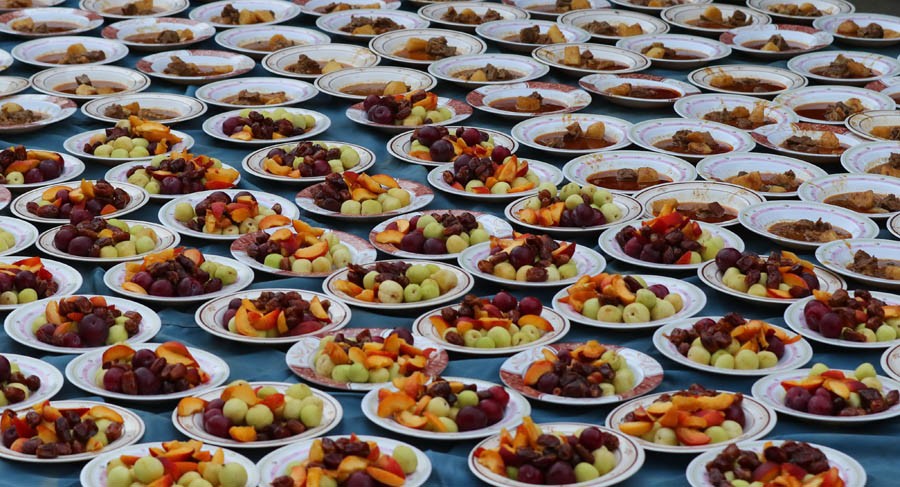
Times have changed and so have the food choices of those observing the fast

In the age of innocence, as soon as the siren or Mufti Muneeb announced that the Ramzan moon had been sighted, me and my family would climb on the roof, try and look at the thin crescent in the skies, make dua, and head out to excitedly buy pheni and milk for sehri. We could have bought the pheni earlier, but there was an excitement in buying it once Ramzan had been announced. The dua has remained a constant, but this age of health-consciousness has taken my pheni away.
The idea, back then, was that you need to stuff yourself with such food at sehri that will help you not feel hungry, nor thirsty till Iftar. While that never actually happened, nutritious and filling foods like khajla, pheni, and qeema or aloo parathas kept one full enough at least till mid-day. And then we topped it off with jugs of water, and lay there on a couch later, panting with over-eating, filling up our bellies in the hope that the holy month would suddenly give us the capacity of a camel to store food and fluids.
That was the era where we didn’t care about good cholesterol or bad cholesterol, and it didn’t really matter if, instead of losing weight, Ramzan meant gaining a few pounds. Ramzan is about self-control, starting with food. It actually has been interpreted by a foodie nation as being just the opposite -- about indulgence in food. But with awareness about healthier food choices, all of this may have begun to change, at least in urban Pakistan.
One thing is for sure: the health-conscious fasting person now focuses more on sehri than on iftar, particularly, if the said person also wants to pray peacefully at night, at home or at the masjid. For such people, they have a completely altered routine in Ramzan. Heavy, oily food, and an overload of beans and chickpeas can cause bloating and digestive issues, even though the latter two are very good sources of nutrition and should be taken in moderation.
The one change that we see is that unlike earlier when people used to first have iftar, then dinner a few hours later, and then sehri, the more conscientious eater is eating just two meals a day, with in-between healthy snacking if needed.
For many of us, the parathas and khajlas made of white flour and laden with fats have been replaced by porridge, oatmeal, brown bread, chapatis made of whole-wheat flour, and even brown rice. However, some things still remain indispensable for sehri, like eggs. Eggs have earned that spot as a favourite for good reason. Eggs provide 13 essential vitamins and minerals (vitamin D, riboflavin, selenium), antioxidants Lutein and zeaxanthin, and high-quality protein, all needed for one who is fasting.
Dates, traditionally seen as the thing to open one’s fast with, have now made their way to the sehri meal as well. They are not just high in antioxidants, fiber, and potassium, but also provide essential nutrients, such as vitamin B-6 and iron. Bananas, an essential component of the fruit chaat, is now being eaten by the health-conscious rozaydaar as part of the morning pre-fast meal as well, as they provide fiber, potassium, vitamin B6, vitamin C, and various antioxidants and phytonutrients.
One of the things a person fasting in summers goes through is possible dehydration, or an electrolyte imbalance. Bananas, known as the leader among fruits and vegetables containing potassium, help control muscles and blood pressure. Thus bananas replenish electrolytes.
While restaurants offer attractive deals, the regular and more cautious people who observe fasting are being seen avoiding the eating out experience. "Unless it is unavoidable, me and my family have stopped eating out to eat at iftar," says a regular fast-keeper. "The food in restaurants, no matter how tasty, will be always more oily, more rich in spices, and probably less hygienically prepared compared to home-cooked food."
"When the fast is broken after almost 15 hours, it takes the body time to adjust to eating and drinking. It’s not a good idea to suddenly overload your system after a break from eating for a long time. The food’s not going anywhere! Why not have it in breaks, going gentle on your system?"
Also read: Oh, this makes sense
The new entrants are the health-benefit items that once were seen as medicinal items, but are now seen as "snacks". You might see a particularly health-aware friend munching on iceberg lettuce with pine nuts topped with chia seeds as a post-iftar snack. Another relative might be having a combo of flaxseed, pumpkin seeds, and prunes with yogurt at sehri. And yet another one might be seen sprinkling moringa leaves powder on top of a sugar-free fruit chaat.
Different strokes for different rozaydaars.
Yes, times have changed and so have the food choices of those observing fast. Many of these changes are positive. Perhaps people have begun to realise that Ramzan and fasting do not remind us of stuffing our mouths with food on tables laden with 20 items, but in fact this month is a reminder of the joys of simple, wholesome, healthy food that is a blessing from the Creator. Abundance is, then, perhaps, in our attitude towards food, not in the quantity. It is the month of gratitude. Good health calls for gratitude, and practical gratitude demands taking care of your health.
Happy fasting and healthy feasting.